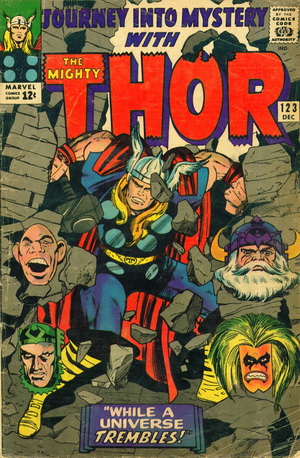
Published: December, 1965
Script: Stan Lee
Pencils: Jack Kirby
Inks: Vince Colletta
Letters: Artie Simek
Almost two years ago, I did a Thor feature called POWER!!!, so when I came up with the idea to call this post “Absolute Power,” I was at first afraid I might be repeating myself. And to some degree, I am. But I’ve decided to forgive myself and go ahead with it anyway, because I realized so many themes within Marvel Comics do indeed keep repeating themselves, so it’s perfectly okay to keep talking about them, though perhaps, hopefully, each time with a slightly different twist. The theme emerging in this issue of Journey into Mystery recalls that old adage, “Power corrupts; absolute power corrupts absolutely.”
So, POWER is power, but absolute power is actually a whole ’nother thing. Each character in this story seems interested, to varying degrees, in acquiring what they deem to be absolute power, and it makes for some interesting commentary on human—and Asgardian—nature.
HOBBS
As a newspaper reporter, Harris Hobbs desires the power of knowledge. To a reporter, knowledge is power, and the super-sized scoop of having a front row seat in Asgard is more alluring than anything Hobbs ever dreamed possible. In fact, he is so consumed with his desire to see Asgard that, to seal the deal, he tells Thor 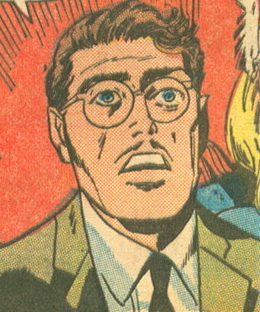 “You can even erase it from my memory!” On one level, that doesn’t actually make sense, but on another level, even if he can’t remember it, the truth would still exist that “I would have done what no newsman before me has ever done!”
“You can even erase it from my memory!” On one level, that doesn’t actually make sense, but on another level, even if he can’t remember it, the truth would still exist that “I would have done what no newsman before me has ever done!”
THE DEMON
Before we get into the crux of the Asgardian drama, let’s take a side trip to see what’s going on with some unfinished Asgardian business from the recent “Trial of the Gods” storyline. In this issue, we finally discover what happened to the errant Norn Stone (remember the 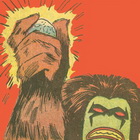 misplaced Norn Stone from issue #120?—Helpful Chrissy…). I never really thought Stan and Jack simply forgot about it, and now at last, it reappears, triggering a new dramatic predicament on planet Earth.
misplaced Norn Stone from issue #120?—Helpful Chrissy…). I never really thought Stan and Jack simply forgot about it, and now at last, it reappears, triggering a new dramatic predicament on planet Earth.
When we first meet the villain who will be called the Demon, he is merely a witch doctor, asking his gods to aid him in ridding the land of invaders, when the Norn Stone plops directly in front of him. Once he is under its powerful spell, he becomes much more than a simple community servant. Now he wants to use this gift of “matchless power” to conquer, shake, and “rule the world!” The absolute power of the Stone has absolutely corrupted his original good intentions.
ABSORBING MAN
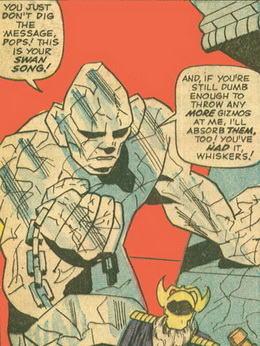 Back in Asgard, the Absorbing Man reveals to Odin his plan to “rule the whole blamed Universe!” Sounds to me like a consuming desire for absolute power! Incidentally, the adjective “blamed” is something I’ve seen before in Marvel Comics, and I’m not 100% sure what it means, but my best guess is that it’s a polite way of saying “dammed.” But there’s one thing I know for sure: we don’t need anyone ruling the whole blamed Universe who uses profanity on any level to explain their goals. And while we’re at it, let’s also not have rulers of the Universe (or anything else, for that matter…) who refer to their opponents by “cute” nicknames like “Pops,” “Goldilocks” and “Ol’ Whitey.” Sigh…
Back in Asgard, the Absorbing Man reveals to Odin his plan to “rule the whole blamed Universe!” Sounds to me like a consuming desire for absolute power! Incidentally, the adjective “blamed” is something I’ve seen before in Marvel Comics, and I’m not 100% sure what it means, but my best guess is that it’s a polite way of saying “dammed.” But there’s one thing I know for sure: we don’t need anyone ruling the whole blamed Universe who uses profanity on any level to explain their goals. And while we’re at it, let’s also not have rulers of the Universe (or anything else, for that matter…) who refer to their opponents by “cute” nicknames like “Pops,” “Goldilocks” and “Ol’ Whitey.” Sigh…
Later, when Loki thanks Absorbing Man very kindly for his services and attempts to put this genie back in the bottle, Absorbing Man is simply not having it. He’s had a taste of too much power to back away from it now, and he’s willing to fight Loki to retain it.
LOKI
All along, Loki has been scheming to gain absolute power, but he’s never shown enough wisdom to realize that evil and evil never work well together. He’s miscalculated the  motivations of the Absorbing Man, which leads to this awesome fight for Odin’s scepter, during which Loki, in his typical Asgardian-centric view, loudly proclaims that by ruling Asgard, he will “rule the universe!” And, there it is again: absolute power.
motivations of the Absorbing Man, which leads to this awesome fight for Odin’s scepter, during which Loki, in his typical Asgardian-centric view, loudly proclaims that by ruling Asgard, he will “rule the universe!” And, there it is again: absolute power.
ODIN
Odin’s Scepter of Supremacy appears to be one of the most powerful objects in Asgard, so of course, Loki and Absorbing Man fight for control of it. One thing, though, that neither villain realizes, but wise old Odin sagely reveals: “My power rests not in any ceremonial scepter, but deep within myself.”
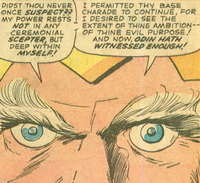 Absolute power, REAL power, is Odin having the wisdom to realize what’s about to happen, and the patience to wait for events to play out, for “The play is not yet ended!”
Absolute power, REAL power, is Odin having the wisdom to realize what’s about to happen, and the patience to wait for events to play out, for “The play is not yet ended!”
THOR
Thor, of course, is younger and brasher than his prudent parent, and immediately wants to attack the problem of the Scepter Battle with his great physical strength. Odin bids him, “Hold, mighty Thor!” When the danger is past, Odin takes a moment to recognize and praise his favorite son, for “It is far more difficult to STAY thy arm when thy very soul cries out for battle.” So ultimately, in this story, though Thor’s power frequently manifests itself in battle, his absolute power comes from obeying his father, who is also his king.
TOO MUCH POWER
But let’s take a moment to consider all of Thor’s mighty powers. Frankly, there are too many, and they are too absolute. And that causes a problem for the storytelling.
First, it’s worth noting that in the past, we saw that Thor has the power to turn back time. Well, if he can do that, why not just turn back time whenever something goes awry? If it’s not so easy to get it right the first time, and he indeed has the power to turn back time, why not simply insert himself into a repeating loop, à la Groundhog Day, where each repeat brings him closer and closer to what he hopes to achieve?
(And do I even need to mention Dr. Strange, in his self-titled movie, repeatedly approaching Dormammu, proclaiming “Dormammu, I’ve come to bargain!” until he finally wears down the super-villain’s patience.)
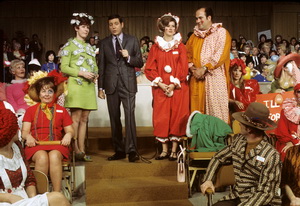 If Thor has the power to make people forget, why “make a deal” with Hobbs to take him to Asgard, then wipe his memory afterwards? Why not just do his hocus pocus? “Let’s not and say we did.”
If Thor has the power to make people forget, why “make a deal” with Hobbs to take him to Asgard, then wipe his memory afterwards? Why not just do his hocus pocus? “Let’s not and say we did.”
I suspect there might be something else going on here. Though Hobbs himself initially suggests Ctrl-Alt-Delete as part of their pact, in the end it seems unclear if Thor actually intends to do this. My sense is that Thor is now relying on what he perceives to be a “Gentleman’s Agreement” between himself and Hobbs.
“Let’s not and say we did” is certainly cleaner and easier than bringing Hobbs to Asgard—but nowhere near as dramatic as allowing the readers to see Asgard through Hobbs’ human eyes. Thor’s second choice of a memory wipe also could have served in a pinch—but doesn’t really seem very noble. There’s going to be a memory wipe, one way or another, but because Thor is impressed by Hobbs’ courage, he nobly enters in this gentleman’s agreement. Making a decision to trust a fellow being deepens Thor’s character; and, at the same time, maintains the dramatic possibility this trust might be misplaced, and will someday come back to haunt him.
The writers of comics and fantasy need to be careful they don’t imbue their heroes with too many powers, with—dare I say it?—absolute power, because then, guess what? It’s awfully boring for the audience. Villains, heroes and humans alike, we all need to have an Achilles Heel, or what’s the point?
 “The Jaws of the Dragon!”
“The Jaws of the Dragon!”
Script: Stan Lee
Pencils: Jack Kirby
Inks: Vince Colletta
Letters: Artie Simek
The short Tales of Asgard installment at the end of this issue, also conveniently plays right into my theme. We begin with Odin atop the “tallest peak in the Universe,” witnessing the absolute power of Ragnorak heading their way. Ragnorak, we are reminded, is “the day on which even the gods shall perish!” If that isn’t absolute power, then what is?
Out at sea, the seafarers are about to be swallowed up by the jaws of a dragon, but Balder somehow knows the absolute power of the horn he carries. He risks his life to blow the horn, which shatters the dragon’s jaw, thus saving them all. You know, I’ve always had a good feeling about that Balder. When are we going to finally meet him in the MCU? (And who will play him?)
I’m reminded of the Biblical account of Joshua at the Battle of Jericho, where the sound of a horn caused walls to come tumbling down, thus securing the victory for the good guys. In both accounts, it’s a NOISE that gets the job done. 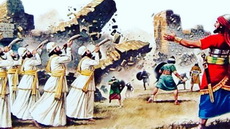 Whether a musical note, or the power of language expressed in the Bible or a comic book, we should remain well aware of the absolute power words can have to change our lives, our world…even the whole blamed universe.
Whether a musical note, or the power of language expressed in the Bible or a comic book, we should remain well aware of the absolute power words can have to change our lives, our world…even the whole blamed universe.
| Want to read this comic on your computer? Marvel has a scan! Want to own the story? Buy the Masterworks! |














